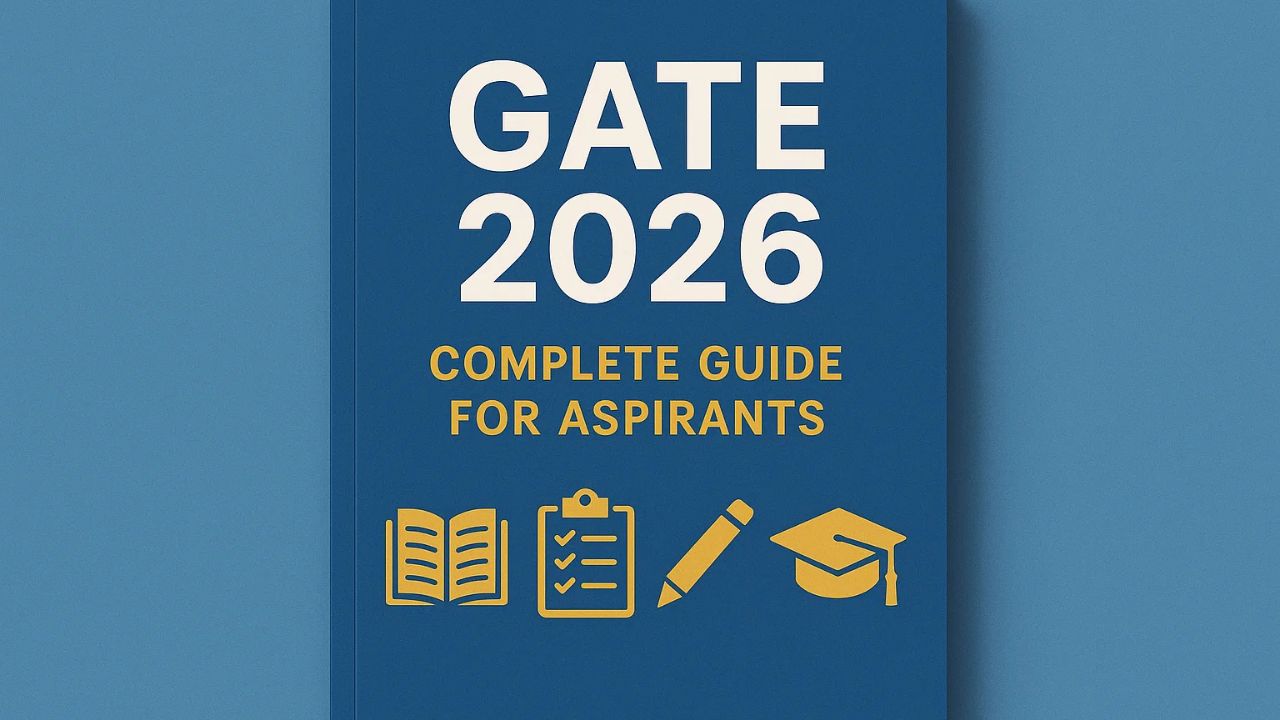The Graduate Aptitude Test in Engineering (GATE) 2026 is a prestigious national-level examination conducted for admissions to postgraduate programs and recruitment in top public sector undertakings. This article covers GATE 2026 eligibility, syllabus, exam pattern, important dates, preparation strategies, and career opportunities.
Introduction
The Graduate Aptitude Test in Engineering (GATE) is one of the most competitive examinations in India for students of engineering, technology, architecture, and science backgrounds. GATE 2026 is expected to witness a large number of aspirants due to its dual advantage – admission to top institutes like the IITs, NITs, and IISc for higher studies, as well as eligibility for recruitment in Public Sector Undertakings (PSUs).
This exam is jointly conducted by the Indian Institute of Science (IISc) Bangalore and seven Indian Institutes of Technology (IITs) on behalf of the National Coordination Board (NCB). With technological advancement and the growing demand for research and higher education, GATE has become a gateway for aspirants aiming at academic excellence and professional success.
Stay updated with exam notifications on Smart Bharat Manch Exam Updates
GATE 2026 Eligibility
Eligibility for GATE 2026 ensures that students from diverse educational backgrounds can participate. Candidates must have completed or be in the final year of their undergraduate degree in engineering, technology, architecture, or relevant science fields.
Some key eligibility highlights include:
- Bachelor’s degree in Engineering/Technology (4 years after 10+2 or 3 years after diploma).
- Master’s degree in Science/Mathematics/Statistics/Computer Applications or equivalent.
- Final-year students are also eligible to apply.
This inclusivity allows both fresh graduates and working professionals to appear for the exam, broadening its scope and accessibility.
Download complete syllabus from the Official GATE Website.
GATE 2026 Exam Pattern
Understanding the exam pattern is crucial for success. GATE 2026 will be conducted as a Computer-Based Test (CBT) with multiple sessions for different subjects.
- Mode: Online (Computer-Based).
- Duration: 3 hours.
- Questions: 65 questions.
- Types: Multiple Choice Questions (MCQs), Multiple Select Questions (MSQs), and Numerical Answer Type (NAT) questions.
- Marks: 100 total marks.
- Sections: General Aptitude (15%), Engineering Mathematics (if applicable), and Core Subject.
The marking scheme includes negative marking for MCQs, whereas NAT and MSQs do not have negative marks.
GATE 2026 Syllabus
The syllabus varies according to the subject paper chosen by the candidate. GATE 2026 will offer over 30 disciplines, including Civil Engineering (CE), Mechanical Engineering (ME), Computer Science and Information Technology (CS), Electrical Engineering (EE), and Electronics and Communication Engineering (EC).
General Aptitude remains common for all papers and tests reasoning, analytical, and language skills. Engineering Mathematics is compulsory for many papers, while core subjects differ as per specialization.
Candidates can access the detailed syllabus on the official GATE website. For example, the GATE official website provides downloadable syllabi and previous year question papers.
Important Dates for GATE 2026
Although the official schedule will be released later, the tentative timeline for GATE 2026 is:
- Notification release: August 2025
- Registration begins: September 2025
- Last date to apply: October 2025
- Admit card release: January 2026
- Exam dates: February 2026 (multiple sessions)
- Results announcement: March 2026
- Counselling and admissions: April–July 2026
Aspirants must regularly check updates to avoid missing deadlines.
Preparation Strategy for GATE 2026
Success in GATE requires dedication, strategic planning, and consistent effort. Candidates should follow a well-structured preparation plan that includes:
Understanding the Syllabus and Exam Pattern
Before starting, aspirants must go through the complete syllabus and exam structure to allocate time effectively.
Creating a Study Plan
A balanced timetable with dedicated hours for core subjects, aptitude, and revision can enhance productivity.
Practicing Previous Year Papers
Solving past GATE papers helps in understanding the difficulty level and improves time management skills.
Taking Mock Tests
Regular mock tests not only assess preparation levels but also help in overcoming exam pressure.
Revision
Timely revision is essential to retain concepts and formulas.
Online coaching platforms, free resources, and standard textbooks remain popular tools for preparation.
You can read a related guide: Balanced Diet for Everyday Health to maintain mental and physical energy while preparing for exams.
Career Opportunities After GATE 2026
Qualifying GATE opens up diverse career paths:
Higher Studies
Candidates can pursue M.Tech, M.E., or Ph.D. programs at reputed institutions such as IITs, IISc, and NITs.
PSU Recruitment
Top PSUs like BHEL, ONGC, IOCL, NTPC, and HPCL recruit through GATE scores, offering lucrative packages and job security.
Research and Fellowship Programs
GATE qualifiers can also apply for Junior Research Fellowships (JRF) and other research-based opportunities.
Overseas Opportunities
Some foreign universities in countries like Singapore and Germany also accept GATE scores for postgraduate admissions.
GATE 2026 Application Process
The registration process will be conducted online through the GATE Online Application Processing System (GOAPS).
Steps include:
- Registration with a valid email ID and mobile number.
- Filling application form with academic details.
- Uploading required documents (photograph, signature, certificates).
- Payment of application fee online.
- Downloading the confirmation page for future reference.
Applicants must carefully verify details to avoid rejection during the verification stage.
Tips for Success in GATE 2026
- Start early preparation and remain consistent.
- Focus on conceptual clarity rather than rote learning.
- Practice time-bound mock tests.
- Work on accuracy to minimize negative marking.
- Maintain physical and mental well-being during preparation.
Internal and External Links
For additional insights on education and exam preparation, you can explore articles on Smart Bharat Manch which cover academic updates and student resources.
For official notifications and updates, candidates must visit the GATE Official Website.
Conclusion
GATE 2026 will continue to serve as a golden opportunity for students aspiring for higher education and career growth. With systematic preparation and the right resources, aspirants can excel in this prestigious exam and secure a promising future. Whether the goal is advanced studies at IITs or recruitment in PSUs, GATE acts as a stepping stone toward success.

